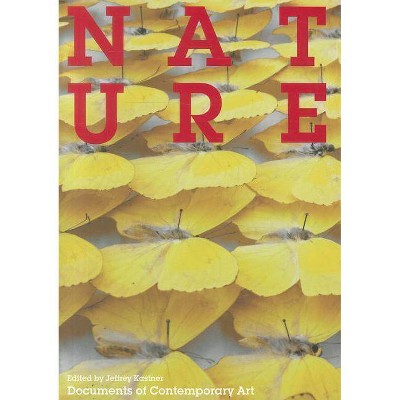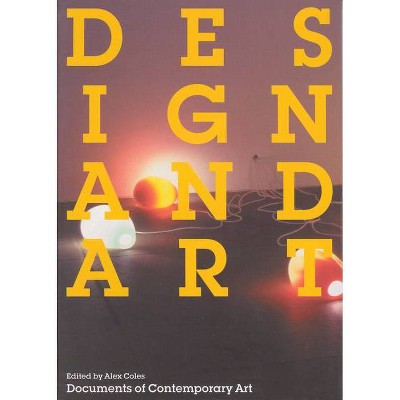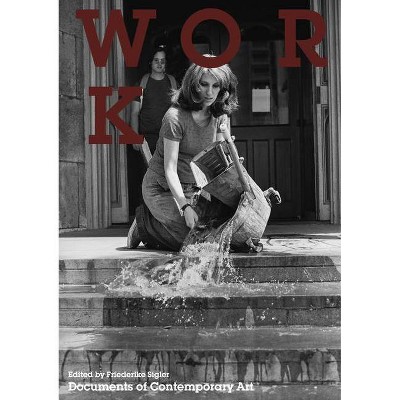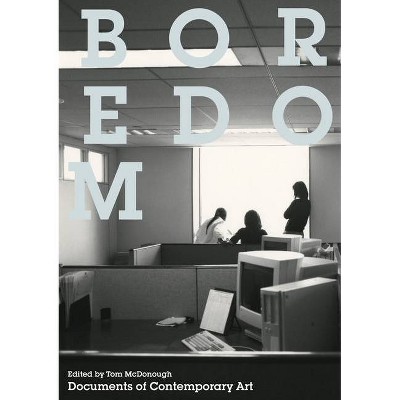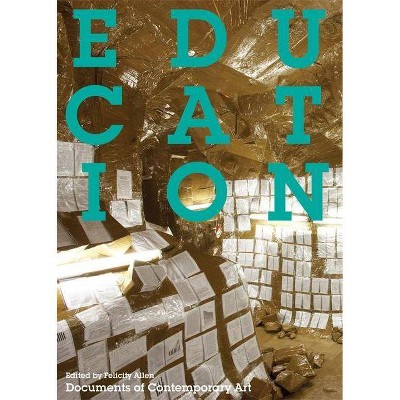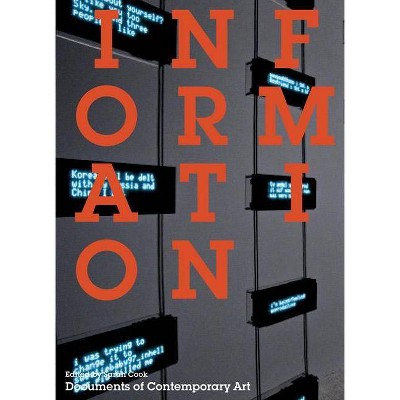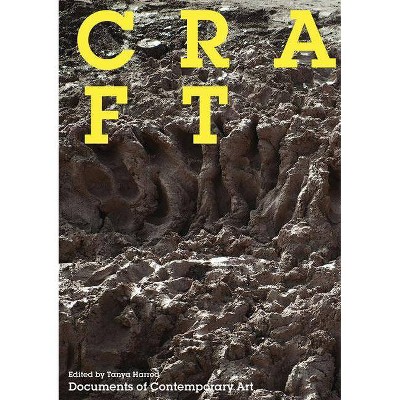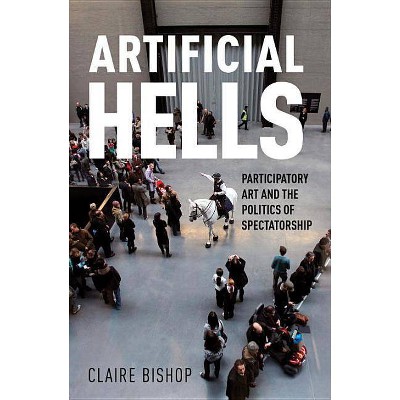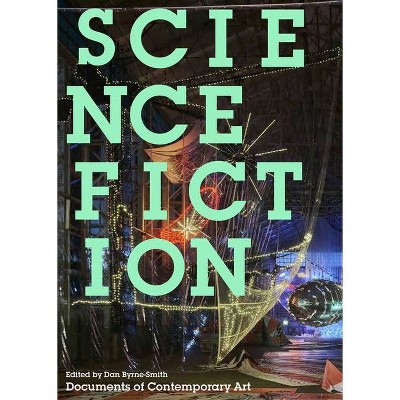Participation - (Documents of Contemporary Art) by Claire Bishop (Paperback)
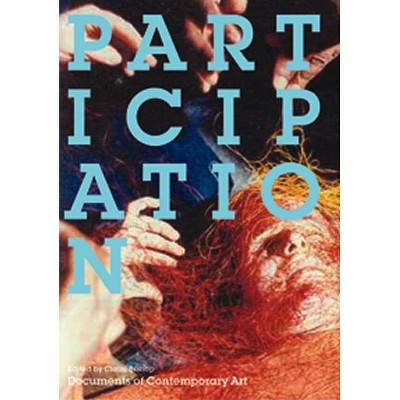
Similar Products
Products of same category from the store
AllProduct info
<p/><br></br><p><b> About the Book </b></p></br></br>Art that seeks to produce situations in which relations are formed among viewers is placed in historical and theoretical context in key writings by critics and artists.<p/><br></br><p><b> Book Synopsis </b></p></br></br><b>Art that seeks to produce situations in which relations are formed among viewers is placed in historical and theoretical context in key writings by critics and artists.</b><p>The desire to move viewers out of the role of passive observers and into the role of producers is one of the hallmarks of twentieth-century art. This tendency can be found in practices and projects ranging from El Lissitzky's exhibition designs to Allan Kaprow's happenings, from minimalist objects to installation art. More recently, this kind of participatory art has gone so far as to encourage and produce new social relationships. Guy Debord's celebrated argument that capitalism fragments the social bond has become the premise for much relational art seeking to challenge and provide alternatives to the discontents of contemporary life. This publication collects texts that place this artistic development in historical and theoretical context. </p><p><i>Participation</i> begins with writings that provide a theoretical framework for relational art, with essays by Umberto Eco, Bertolt Brecht, Roland Barthes, Peter Bürger, Jen-Luc Nancy, Edoaurd Glissant, and Félix Guattari, as well as the first translation into English of Jacques Rancière's influential Problems and Transformations in Critical Art. The book also includes central writings by such artists as Lygia Clark and Hélio Oiticica, Joseph Beuys, Augusto Boal, Felix Gonzalez-Torres, Thomas Hirschhorn, and Rirkrit Tiravanija. And it features recent critical and curatorial debates, with discussions by Lars Bang Larsen, Nicolas Bourriaud, Hal Foster, and Hans-Ulrich Obrist. </p><p><i>Copublished with Whitechapel Art Gallery, London</i></p><p/><br></br><p><b> Review Quotes </b></p></br></br><br>"A rigorous introduction to debates on the relations between art and society, community and collective agency, from the rise of socially based art in the 1960s to the present.... What is an authentic concept of contemporary democracy, and how can art address it? What is the social value of participatory authorship, and what are the aesthetic limits of the social turn in art? These are crucial questions today, and this is an inexhaustible resource for those who want to answer them."--Viktor Misiano, Curator and Chief Editor of "Moscow Art Magazine"<br><br>"Claire Bishop has distilled an opinionated treasury of analytical writings, empirical narration, and curatorial criticism. Her editorial enterprise results in a volume that lays out key concepts intrinsic to recent participatory art practices and illuminates a cross-section of social dynamics such practices activate and express."--Julie Ault, artist, co-founder of Group Material<br><br>"The current focus on relational aesthetics seems to have been largely detrimental to a more complex, nuanced and art-historically informed discussion on participatory practices. Claire Bishop's thoughtful anthology will hopefully begin to remedy this situation. Her book provides the theoretical and historical tools that are essential to perform a closer reading of participatory practices, current and past. Precisely organized and carefully selected, this anthology will surely be consulted widely, both by professionals and students. To its usefulness and clarity, Bishop's book adds a concern for a geographically expanded field of inquiry, so that her version of history is gladly one that does not disregard the evidence - as much recent writing unfortunately still does - when it comes from outside the well-trodden paths of the Western canon."--Carlos Basualdo, Curator of Contemporary Art, Philadelphia Museum of Art<br><br>" A rigorous introduction to debates on the relations between art and society, community and collective agency, from the rise of socially based art in the 1960s to the present.... What is an authentic concept of contemporary democracy, and how can art address it? What is the social value of participatory authorship, and what are the aesthetic limits of the social turn in art? These are crucial questions today, and this is an inexhaustible resource for those who want to answer them." -- Viktor Misiano, Curator and Chief Editor of Moscow Art Magazine<br><br>" Claire Bishop has distilled an opinionated treasury of analytical writings, empirical narration, and curatorial criticism. Her editorial enterprise results in a volume that lays out key concepts intrinsic to recent participatory art practices and illuminates a cross-section of social dynamics such practices activate and express." -- Julie Ault, artist, co-founder of Group Material<br><br>" The current focus on relational aesthetics seems to have been largely detrimental to a more complex, nuanced and art-historically informed discussion on participatory practices. Claire Bishop's thoughtful anthology will hopefully begin to remedy this situation. Her book provides the theoretical and historical tools that are essential to perform a closer reading of participatory practices, current and past. Precisely organized and carefully selected, this anthology will surely be consulted widely, both by professionals and students. To its usefulness and clarity, Bishop's book adds a concern for a geographically expanded field of inquiry, so that her version of history is gladly one that does not disregard the evidence & ndash; as much recent writing unfortunately still does & ndash; when it comes from outside the well-trodden paths of the Western canon." & ndash; - Carlos Basualdo, Curator of Contemporary Art, Philadelphia Museum of Art<br><br>" A rigorous introduction to debates on the relations between art and society, community and collective agency, from the rise of socially based art in the 1960s to the present.... What is an authentic concept of contemporary democracy, and how can art address it? What is the social value of participatory authorship, and what are the aesthetic limits of the social turn in art? These are crucial questions today, and this is an inexhaustible resource for those who want to answer them." --Viktor Misiano, Curator and Chief Editor of "Moscow Art Magazine"<br><br>" Claire Bishop has distilled an opinionated treasury of analytical writings, empirical narration, and curatorial criticism. Her editorial enterprise results in a volume that lays out key concepts intrinsic to recent participatory art practices and illuminates a cross-section of social dynamics such practices activate and express." --Julie Ault, artist, co-founder of Group Material<br><br>" The current focus on relational aesthetics seems to have been largely detrimental to a more complex, nuanced and art-historically informed discussion on participatory practices. Claire Bishop's thoughtful anthology will hopefully begin to remedy this situation. Her book provides the theoretical and historical tools that are essential to perform a closer reading of participatory practices, current and past. Precisely organized and carefully selected, this anthology will surely be consulted widely, both by professionals and students. To its usefulness and clarity, Bishop's book adds a concern for a geographically expanded field of inquiry, so that her version of history is gladly one that does not disregard the evidence – as much recent writing unfortunately still does – when it comes from outside the well-trodden paths of the Western canon." – -Carlos Basualdo, Curator of Contemporary Art, Philadelphia Museum of Art<br><br>--Julie Ault, artist, co-founder of Group Material<br><br>--Viktor Misiano, Curator and Chief Editor of "Moscow Art Magazine"<br><br>?-Carlos Basualdo, Curator of Contemporary Art, Philadelphia Museum of Art<br><p/><br></br><p><b> About the Author </b></p></br></br>Claire Bishop is the author of <i>Installation Art: A Critical History</i> and a contributor to many art journals, including <i>ArtForum</i>, <i>Flash Art</i>, and <i>October</i>. She is a Lecturer in History of Art at the University of Warwick. <p/>Umberto Eco was an Italian semiotician, philosopher, literary critic, and novelist. He is the author of <i>The Name of the Rose, Foucault's Pendulum</i>, and <i>The Prague Cemetery</i>, all bestsellers in many languages, as well as a number of influential scholarly works. <p/>Jean-Luc Nancy is a French philosopher and the Georg Wilhelm Friedrich Hegel Chair and Professor of Philosophy at the European Graduate School. <p/>Félix Guattari (1930-1992), post-'68 French psychoanalyst and philosopher, is the author of <i>Anti-Oedipus </i>(with Gilles Deleuze), and a number of books published by Semiotext(e), including <i>The Anti-Oedipus Papers, Chaosophy</i>, and <i>Soft Subversions.</i> <p/>Writer, filmmaker, and cultural revolutionary, Guy Debord (1931-1994) was a founding member of the Lettrist International and Situationist International groups. His films and books, including <i>Society of the Spectacle</i> (1967), were major catalysts for philosophical and political changes in the twentieth century, and helped trigger the May 1968 rebellion in France. <p/>Eda Čufer, one of the founding members of NSK, is a dramaturge, curator, and writer and the cofounder of Scipion Nasice Sisters Theater. <p/>Thomas Hirschhorn (b. 1957) is a Swiss artist known for large sculptures and ambitious projects, often constructed of everyday, makeshift materials. <p/>Nicolas Bourriaud was the co-director of the Palais de Tokyo in Paris and an art advisor for the Victor Pinchuk foundation in Kiev. His previous books include <i>L'ère tertiaire</i>, <i>Esthétique relationnelle</i>, and <i>Formes de vie</i>. <p/>Lars Bang Larsen is an art historian and curator. He is coeditor of several volumes published by Sternberg Press, including <i>Fundamentalisms of the New Order</i> and <i>The Phantom of Liberty</i>. <p/>Molly Nesbit teaches at Vassar College. She is a contributing editor at Artforum and is the author of <i>Atget's Seven Albums</i> and <i>Their Common Sense.</i> <p/>Hal Foster is Townsend Martin '17 Professor of Art and Archaeology at Princeton University and the author of <i>Prosthetic Gods</i> (MIT Press) and other books.
Price History
Cheapest price in the interval: 21.99 on November 6, 2021
Most expensive price in the interval: 24.99 on October 28, 2021
Price Archive shows prices from various stores, lets you see history and find the cheapest. There is no actual sale on the website. For all support, inquiry and suggestion messagescommunication@pricearchive.us
